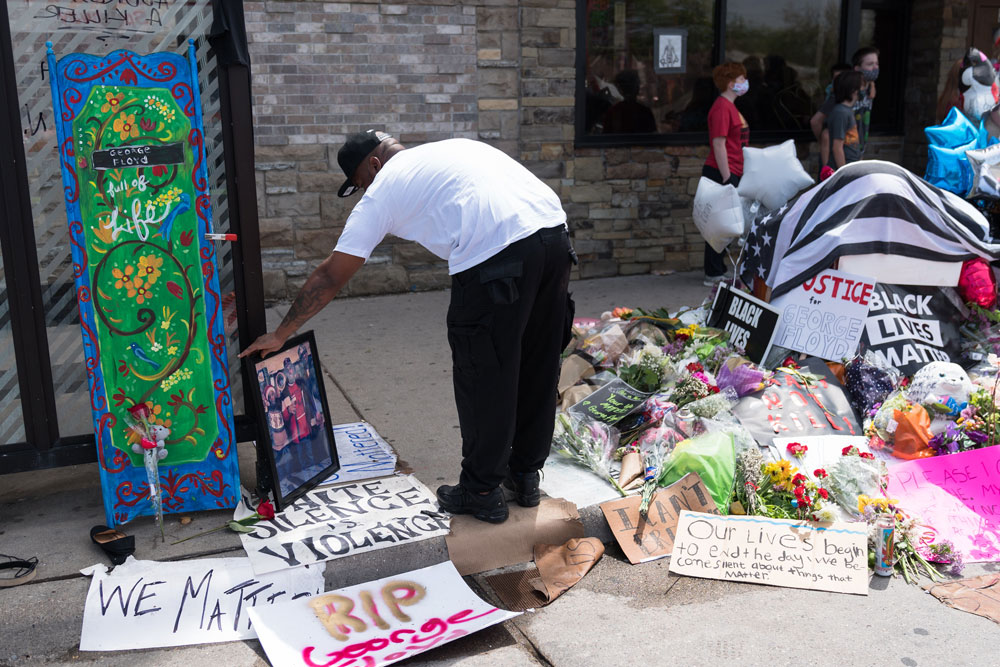
May 31, 2020; Common Dreams and Crosscut
George Floyd’s murder by a Minneapolis policeman has confirmed once again that too often in America, Black and Brown lives do not matter. Floyd’s tragic death adds to a list that has grown over these past weeks and months. And it comes on top of a pandemic that lays bare America’s stark structural racism and economic inequality, in a nation that has seen 40 million lose their jobs in 10 weeks.
Janice Deguchi, executive director of Seattle’s Neighborhood House, places the disparity in graphic terms when she described the impact of our economic collapse in comments reported by Crosscut. “The low jobless rates of the past several years masked just how precarious the financial picture was,” Deguchi says. “It’s really scraping off that veneer of ‘everything’s OK’ when really it’s not.”
Floyd’s public execution sent a wave of protesters into the streets. Their signs and manifestos were hauntingly reminiscent of those who took to the streets in 1968 in the wake of Dr. Martin Luther King’s assassination, as well as the more recent protests of the police murders of Michael Brown, Freddie Gray, Eric Garner, and countless others.
For Harvard philosopher and activist Dr. Cornel West, what we’re seeing is nothing less than a failed nation. In a CNN interview reported by Common Dreams, West says, “I think we are witnessing America as a failed social experiment.” West adds, “Our nation’s capitalist economy could not generate and deliver in such a way that people could live lives of decency. The nation-state—its criminal justice system, its legal system—could not generate protection of rights and liberties. And now our culture, of course, is so market-driven—everything for sale, everybody for sale—it can’t deliver the kind of nourishment for soul, for meaning, for purpose.”
West also reminds us that Dr. King’s message is often edited to omit the ways he called out the vast disparities in our society:
When I saw those pictures there of Atlanta, you could see Brother Martin right there in Atlanta, saying, “I told you about militarism. I told you about poverty. I told you about materialism. I told you about racism in all of its forms. I told you about xenophobia.” And what you’re seeing in America is those chickens coming home to roost. You are reaping what you sow. And in this instant, you have Brother George—it is so clear—it was a lynching at the highest level. Nobody can deny it.
Rev. Dr. William J. Barber II, national president of Repairers of the Breach and a leader of the Poor People’s Movement, writing in Common Dreams, holds out some cause for hope amid the pain:
Those of us who have faced the lethal force of systemic racism have also learned something else in the American story. We can be wounded healers. … When hands that once picked cotton have joined together with white hands and Native hands, brown hands and Asian hands, we have been able to fundamentally reconstruct this democracy. Slavery was abolished. Women did gain the right to vote. Labor did win a 40-hour work week and a minimum wage. The civil rights movement in the face of lynching and shooting did expand voting rights to African Americans.
Sign up for our free newsletters
Subscribe to NPQ's newsletters to have our top stories delivered directly to your inbox.
By signing up, you agree to our privacy policy and terms of use, and to receive messages from NPQ and our partners.
Even so, Barber recognizes how much has not been done, and how many have been left out: “Countless activists, grassroots leaders, and preachers were screaming non-violently long before now: ‘Change, America! Change, Minneapolis!’ Rather than listen, many of those in power saw even their nonviolent protest as an unwelcome development.”
West likewise observes that, “When you talk about the masses of Black people—the precious poor and working-class black people, brown, red, yellow, whatever color—they’re the ones left out, and they feel so thoroughly powerless, helpless, hopeless—then you get rebellion.”
West also observes that even when people of color reach positions of power, they often exercise that power with a class bias that leaves many people of color behind:
Too often, our Black politicians, professional class, middle class become too accommodated to the capitalist economy, too accommodated to a militarized nation-state, too accommodated to the market-driven culture of celebrities, status, power, fame, all that superficial stuff…
You’ve got a neoliberal wing of the Democratic Party that is now in the driver’s seat, and they really don’t know what to do, because all they want to do is show more Black faces.
Differences in tone aside, both Barber and West emphasize the need for movement-based change. Barber observes, “There is a sense in which right now we must refuse to be comforted too quickly. Only if these screams and tears and protests shake the very conscience of this nation…can we hope for a better society on the other side of this.”
For West, too, social movement is fundamental. West says, “We must have an antifascist coalition against what’s going on in the White House and the Republican Party. And we have to tell the truth about the milquetoast, cowardly activity too often we see too often in the neoliberal wing of the Democratic party. And we must be critical of ourselves in terms of keeping alive the highest moral and spiritual standards of Martin Luther King, Jr. and Fanny Lou Hammer and Ella Baker.”
Many elected officials would have us seek to restore “law and order” and ignore the deeper message of this moment. Trust, they say, that this time we will do what we promised so many times before. West reminds us of the danger in this: “White supremacy is going to be around for a long, long, long, long, long, long, long, long time; don’t be surprised when this happens again.”—Martin Levine













